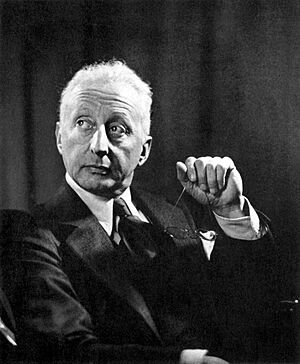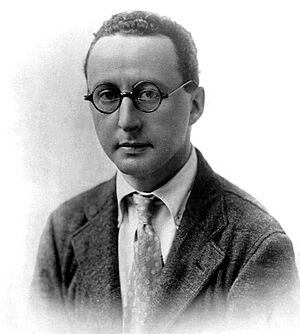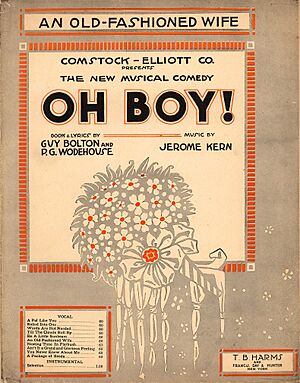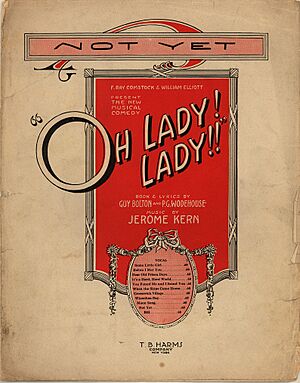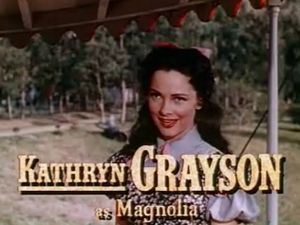Jerome Kern facts for kids
Jerome David Kern (born January 27, 1885 – died November 11, 1945) was an American composer. He wrote music for many musicals and popular songs. He was one of the most important American theater composers of his time.
Kern wrote over 700 songs for more than 100 stage shows. Some of his most famous songs include "Ol' Man River", "Can't Help Lovin' Dat Man", "Smoke Gets in Your Eyes", and "The Way You Look Tonight". He worked with many talented writers like Oscar Hammerstein II and P. G. Wodehouse.
Kern was from New York City. He created many Broadway musicals and Hollywood movies during his 40-year career. He brought new ideas to music, like faster dance rhythms and jazz sounds. His songs helped tell the story and develop characters more than in other musicals of his day. This set a new standard for future musicals.
While many of Kern's shows were popular, only Show Boat is still performed often today. However, songs from his other shows are still very popular. Many have even become jazz standards.
Biography
Early Life and Music Beginnings
Jerome Kern was born in New York City in 1885. His father, Henry, was a German immigrant. His mother, Fannie, was an American Jew who taught piano. Jerome grew up in Manhattan and learned to play piano and organ from his mother.
In 1897, his family moved to Newark, New Jersey. Jerome wrote songs for his high school's first musical in 1901. He also wrote music for a play called Uncle Tom's Cabin in 1902. He left high school early to pursue music.
At first, his father wanted him to work in business. But Jerome made a big mistake: he was supposed to buy two pianos for the store, but he ordered 200! After that, his father let him study music. In 1902, Kern went to the New York College of Music. He studied piano and music theory. His first published song, "At the Casino," came out that same year. He continued his music studies in Germany from 1903 to 1905.
First Songs and London Connections
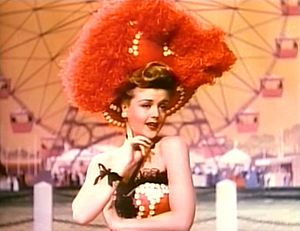
When he returned to New York, Kern worked as a rehearsal pianist on Broadway. He also worked as a "song-plugger" for music publishers in Tin Pan Alley. This meant he played new songs to help sell them.
In London, he got a job writing songs for Broadway versions of British shows. In 1905, he wrote "How'd you like to spoon with me?" for the musical The Earl and the Girl. He also added songs to other shows like The Catch of the Season (1905).
Kern spent a lot of time in London. He wrote songs for shows like The Beauty of Bath (1906). He met important people there, like George Grossmith Jr.. In 1909, he met Eva Leale, who worked at an inn in England. They fell in love and got married in 1910.
Kern also wrote music for silent films. His earliest known film music was for a movie series called Gloria's Romance in 1916. He was also one of the people who started ASCAP, a group that protects musicians' rights.
Kern's first full musical score was for The Red Petticoat (1912). By World War I, over a hundred of his songs were used in about 30 shows. Many of these were Broadway versions of European shows. A famous song from this time was "They Didn't Believe Me" (1914). This song had a new, faster rhythm, different from the usual waltz. It used elements of American styles like ragtime and syncopation. This made Kern very popular on Broadway.
In May 1915, Kern was supposed to sail on the RMS Lusitania but he overslept and missed the ship. The ship was sunk, and many people died, including his friend Charles Frohman.
Princess Theatre Musicals
Between 1915 and 1920, Kern wrote music for 16 Broadway shows. He also contributed to London hits and revues like the Ziegfeld Follies. His most famous works from this time were for the Princess Theatre. This was a small theater with only 299 seats.
Kern and writer Guy Bolton were asked to create small, clever musicals for this theater. These "Princess Theatre shows" were different from other musicals. They had smart plots, songs that fit the story, and natural acting. This was new compared to the big, fancy shows popular at the time. Kern and Bolton made sure the songs helped move the story forward and develop the characters.
Their first Princess Theatre show was Nobody Home (1915). It ran for 135 performances. Next, they created Very Good Eddie, which was a big hit with 341 performances. In 1917, P. G. Wodehouse joined the team as a lyricist.
Their show Oh, Boy! (1917) was a huge success, running for 463 performances. Other shows included Have a Heart (1917) and Leave It to Jane (1917).
Oh, Lady! Lady!! (1918) was the last successful Princess Theatre show. Kern and Wodehouse had a disagreement, and Kern moved on. The last musical in the series, Oh, My Dear! (1918), was not as popular because Kern only wrote one song for it.
The 1920s and Show Boat
The 1920s were a very busy time for American musical theater. Kern wrote at least one show every year. His first show of 1920 was The Night Boat. Later that year, he wrote the music for Sally. This show was produced by Florenz Ziegfeld and ran for 570 performances. It made the song "Look for the Silver Lining" very famous.
In 1925, Kern met Oscar Hammerstein II. They became close friends and worked together for the rest of Kern's life. Their first show, with Otto Harbach, was Sunny. It featured the song "Who (Stole My Heart Away)?" and was a big hit.
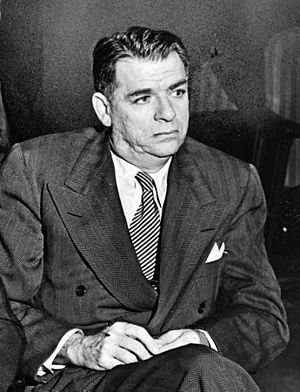
Because of the success of Sally and Sunny, Ziegfeld was willing to take a chance on Kern's next idea in 1927. Kern wanted to turn Edna Ferber's novel Show Boat into a musical. This story was about serious topics like racism and marriage problems, which was unusual for musicals at the time.
Show Boat opened to great reviews and was a huge success. It is considered Kern's greatest work. The show includes famous songs like "Ol' Man River", "Can't Help Lovin' Dat Man", and "Make Believe". It ran for 572 performances on Broadway.
Show Boat was made into a movie twice, in 1936 and 1951. Unlike most of Kern's other musicals, Show Boat is still very popular and performed often today. It was even the first musical to be performed by a major opera company.
Kern's last Broadway show in the 1920s was Sweet Adeline (1929), also with Hammerstein. It was set in the 1890s.
In 1929, Kern sold his large collection of rare books. He had collected many first editions and old writings. The sale made a record amount of money for a single owner's collection.
Hollywood Films and Later Shows
In 1929, Kern went to Hollywood to work on the film version of Sally. He also worked on other films like Sunny (1930). After a short break from films, he returned to the stage.
He worked with Harbach on The Cat and the Fiddle (1931). This musical was about a composer and an opera singer. It included songs like "She Didn't Say Yes". It was a success during the Great Depression.
Music in the Air (1932) was another Kern-Hammerstein show. It is known for songs like "The Song Is You". Roberta (1933) by Kern and Harbach featured songs like "Smoke Gets in Your Eyes" and "Yesterdays". Many famous actors like Bob Hope and Fred MacMurray were in it early in their careers.
Kern's last show in London was Three Sisters (1934). It was not a success. However, its song "I Won't Dance" was later used in the film Roberta. Kern's last new Broadway musical was Very Warm for May (1939). It was not a hit, but it included the classic song "All The Things You Are".
Kern in Hollywood
In 1935, Kern returned to Hollywood as musical films became popular again. He wrote music for many more films. He moved to Hollywood permanently in 1937. After a heart attack in 1939, doctors told him to focus on film scores, which were less stressful.
Kern worked with Dorothy Fields on the film I Dream Too Much (1935). He also wrote two new songs, "I Won't Dance" and "Lovely to Look At", for the Fred Astaire and Ginger Rogers film Roberta (1935). This film was a big hit.
Their next film, Swing Time (1936), included the song "The Way You Look Tonight". This song won an Academy Award for Best Song in 1936. Other songs in Swing Time were "A Fine Romance" and "Pick Yourself Up". Many people consider Swing Time one of the best Fred Astaire and Ginger Rogers musicals.
For the 1936 film of Show Boat, Kern and Hammerstein wrote three new songs. Kern's songs were also used in the film Lady Be Good (1941). This film featured the song "The Last Time I Saw Paris", which won Kern another Oscar.
In his last Hollywood musicals, Kern worked with new partners. With Johnny Mercer for You Were Never Lovelier (1942), he wrote songs like "I'm Old Fashioned". With Ira Gershwin for Cover Girl (1944), he wrote the hit song "Long Ago (and Far Away)". For the film Can't Help Singing (1944), Kern wrote "the best original score" of the star's career.
Kern composed his last film score for Centennial Summer (1946). This film included the song "All Through the Day," which was nominated for an Oscar.
Personal Life and Death
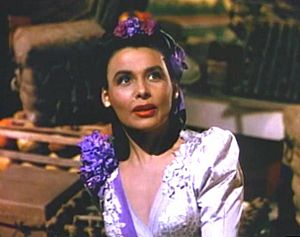
Jerome Kern and his wife, Eva, often spent time on their yacht, which they named Show Boat. He enjoyed collecting rare books and betting on horse races.
In 1945, a movie about Kern's life called Till the Clouds Roll By was being filmed. It was released in 1946 and starred Robert Walker as Kern. Famous singers like Judy Garland and Frank Sinatra sang Kern's songs in the film.
In the fall of 1945, Kern returned to New York City. He was working on a new musical called Annie Get Your Gun. On November 5, 1945, at age 60, he had a cerebral hemorrhage (a type of stroke). He was taken to the hospital.
Oscar Hammerstein II was with him when he passed away. Hammerstein quietly sang Kern's favorite song, "I've Told Ev'ry Little Star," into his ear. When there was no response, Hammerstein knew Kern had died. Irving Berlin later wrote the music for Annie Get Your Gun.
Jerome Kern is buried in Ferncliff Cemetery in New York.
Awards and Recognition
Jerome Kern was nominated for eight Academy Awards and won twice. Seven nominations were for Best Original Song. One nomination was for Best Original Music Score.
- 1936 – Won for "The Way You Look Tonight" (lyrics by Dorothy Fields) from Swing Time
- 1941 – Won for "The Last Time I Saw Paris" (lyrics by Oscar Hammerstein II) from Lady Be Good
Kern was inducted into the Songwriters Hall of Fame in 1970. In 1985, the U.S. Post Office released a postage stamp with his picture on it. The famous guitarist Jerry Garcia was even named after Jerome Kern!
Famous Works
Kern wrote many musicals and contributed songs to others. Here are some of his most notable works:
Early Shows (1904–1911)
- Mr. Wix of Wickham (1904) – He wrote most of the songs for this New York production.
- The Earl and the Girl (1905) – He wrote music and lyrics for the American version.
- The Beauty of Bath (1906) – He contributed to this London show with lyricist P. G. Wodehouse.
- Fluffy Ruffles (1908) – He co-wrote eight of the ten songs.
Productive Years (1912–1924)
- The Red Petticoat (1912) – This was Kern's first complete musical score.
- The Girl from Utah (1914) – He added five songs to the American production.
- Nobody Home (1915) – The first "Princess Theatre show."
- Very Good Eddie (1915) – A very successful show.
- Oh, Boy! (1917) – The most successful Princess Theatre show.
- Leave It to Jane (1917)
- Oh, Lady! Lady!! (1918) – The last Princess Theatre hit.
- The Night Boat (1920)
- Sally (1920) – One of Kern's biggest hits.
- The Cabaret Girl (London 1922)
Later Hits (1925–1939)
- Sunny (1925) – His first collaboration with Oscar Hammerstein II and Otto Harbach.
- Show Boat (1927) – His most famous work, with Hammerstein.
- Sweet Adeline (1929) – With Hammerstein.
- The Cat and the Fiddle (1931) – Kern wrote the music, book, and lyrics with Harbach.
- Music in the Air (1932) – With Hammerstein.
- Roberta (1933) – With Harbach.
- Very Warm for May (1939) – Kern's last stage musical, with Hammerstein.
Famous Songs
Jerome Kern wrote over 700 songs. Here are some of his most famous ones:
- "They Didn't Believe Me" (1914)
- "Look for the Silver Lining" (1920)
- From Show Boat (1927): "Ol' Man River", "Can't Help Lovin' Dat Man", "Make Believe", "You Are Love", and "Bill".
- From Roberta (1933): "Smoke Gets in Your Eyes", "Yesterdays", and "Let's Begin".
- "I Won't Dance" (1935)
- From Swing Time (1936): "A Fine Romance" and "The Way You Look Tonight" (Oscar winner).
- "All the Things You Are" (1939)
- "The Last Time I Saw Paris" (1941) (Oscar winner).
- "I'm Old Fashioned" (1942)
- "Long Ago (and Far Away)" (1944)
Images for kids
See also
 In Spanish: Jerome David Kern para niños
In Spanish: Jerome David Kern para niños
 | William M. Jackson |
 | Juan E. Gilbert |
 | Neil deGrasse Tyson |


